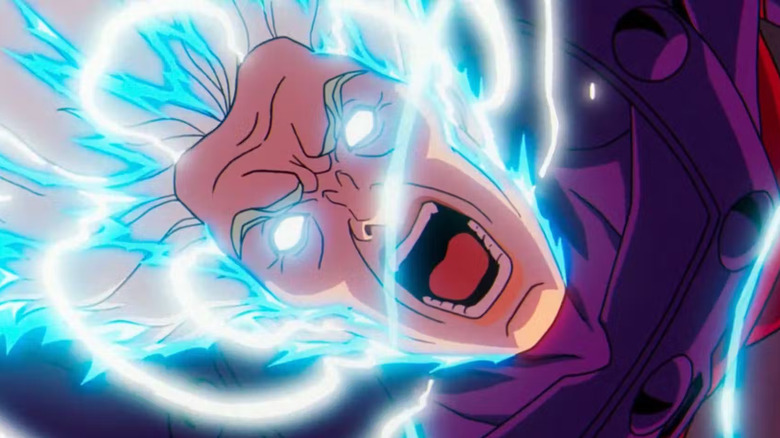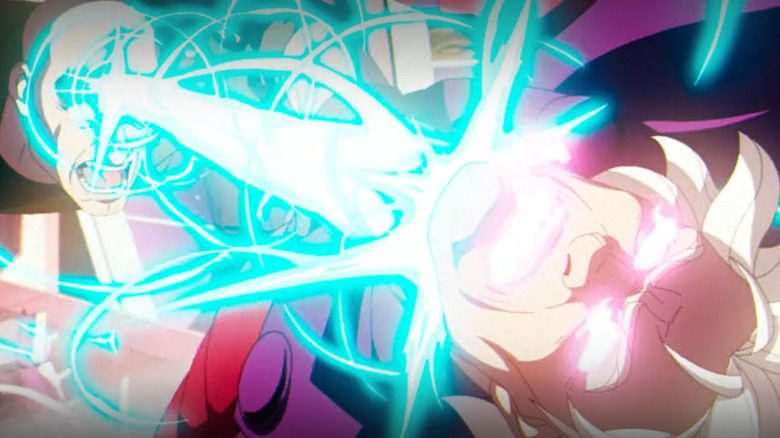X-Men '97 Was A Profound Defeat For Marvel's Mutant Heroes – Because Magneto Was Right
With the first season of "X-Men '97" finished, there's no denying that the animated series revival may be the finest work Marvel Studios has produced since "Avengers: Endgame." What may have started as nostalgia bait evolved into something much more interesting and nuanced after the shocking attack on Genosha. This really did change everything for the show, as the tone got darker and more serious, while the characters became more somber.
Another consequence of this genocide was that the central conflict of all the primary X-Men movies to date — the clash of ideals between Charles Xavier and Erik Magnus Lehnsherr — became much less complicated. How? The cartoon made it rather clear that Magneto was right all along. Humans suck, they will never accept mutants unless they're dead, and thinking otherwise is delusional.
Granted, Magneto has always been right, and the biggest problem with every "X-Men" show and movie is that it tries too hard to deny that, making him a sympathetic, though shortsighted, antagonist. Even "X-Men '97" tries to do a "the end doesn't justify the means" with Magneto and argues that he takes things too far. But there is one key difference in the finale. Magneto is not just a sympathetic antagonist here, he is absolutely in the right, and by the end, he is proven right about just who Charles Xavier really is.
Magneto, the sympathetic antagonist
Marvel Studios has a history of sympathetic villains. Ever since phase three of the Marvel Cinematic Universe, we've seen more and more sympathetic villains with tragic backstories, or at least understandable and relatable goals with misguided approaches. This, of course, culminated with the one-two punch of Killmonger and Thanos. The former sought to correct a horrendous historic wrong and use Wakanda's might to strike back at oppressors, while the latter sought to do what he thought had to be done to put the universe back in balance. In the time since, Marvel — like Disney at large — has overdone it with the sympathetic villains, making it hard to root for the heroes instead.
No villain exemplifies this better than Magneto. Ever since his appearance in the first "X-Men" movie back in 2000, this Holocaust survivor has been easy to root for. It doesn't help that his grand evil plan was to turn people into mutants so they could understand the people they hated, while also giving them cool powers and bringing them to the next step in evolution. Still, compared to the X-Men, who selflessly fought to protect mankind and mutants from those who would harm them, or even mutate them against their will, Magneto was in the wrong comparatively. Simply put, even if Magneto is in the right, he is worse than Xavier.
Well, that changed in "X-Men '97," because the finale not only reiterates that humans are a horrible species, but shows Charles Xavier's path of tolerance is paved with the bodies of dead mutants. What's more, it shows Xavier himself is capable of completely inhumane acts of brutal violence when his back is against the wall — the same inhumane and brutal violence he constantly lectures Magneto for.
Xavier, the villain
After Magneto threw the entire planet into darkness, the X-Men set out to stop him in the finale, and the moment Magneto's helmet is removed in battle, Xavier does something he supposedly would never do: enter Magneto's mind and violate it with horrifying psychic blasts. Xavier, the advocate for peace and tolerance, tortures his former best friend, the man he claims to be his family, and takes over not just his mind, but his body.
Indeed, Xavier seems to literally destroy Magneto from the inside out, rebuilding him in a way that is more amenable to his own dream, then puppeteers his body to bring electricity back to earth. He is justified, in his mind, because it's an act that will save Earth and, in turn, save mutants from further human attacks. But this is still a horrific act of violence, the kind he scolds Magneto for. As usual, what do the X-Men get in return for betraying their own kind? Why, the government decides to shoot them with a bunch of missiles, of course! And unsurprisingly, they fail miserably and instead throw an asteroid on a path to collide with Earth and kill everyone, human and mutant alike. "Humanity would rather die than have kids like us," Bastion says in his final words, as the X-Men spend their time trying to somehow redeem this guy, who literally planned the Genosha genocide, all in the name of Xavier's tolerance.
After the X-Men's disappearance, there are memorials in their name, showing that humans will accept and praise mutants — as long as they're dead. But by then, it doesn't matter. The point has been proven. Magneto won. But at what cost? Xavier became the sympathetic villain he considered Magneto to be, and mutants everywhere lost.
"X-Men '97" season 1 is now streaming on Disney+.

